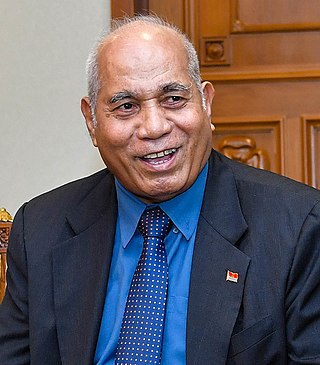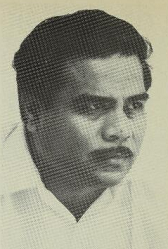 |
|---|
| Subdivisions |
Early parliamentary elections were held in Kiribati on 12 January 1983, with a second round on 19 January. [1] All candidates for the 36 seats ran as independents. Voter turnout was 79.9%.
 |
|---|
| Subdivisions |
Early parliamentary elections were held in Kiribati on 12 January 1983, with a second round on 19 January. [1] All candidates for the 36 seats ran as independents. Voter turnout was 79.9%.
After the government of Ieremia Tabai was defeated 20–15 on a bill on equalising civil servants' salaries on 9 December 1982, Tabai brought back the same bill the following day, including a vote of confidence. After the government lost again, early elections were called. [2]
Ten incumbent MPs lost their seats, including Minister for Health Ataraoti Bwebwenibure and Minister for the Line and Phoenix Group Ieremia Tata. [3]
| Party | Votes | % | Seats | |
|---|---|---|---|---|
| Independents | 36 | |||
| Total | 36 | |||
| Total votes | 19,995 | – | ||
| Registered voters/turnout | 25,011 | 79.94 | ||
| Source: Nohlen et al. | ||||
In the February presidential election, Tabai was re-elected president. Matita Taniera was re-elected Speaker and Teato Teannaki was appointed Vice President. [4]

The islands which now form the Republic of Kiribati have been inhabited for at least seven hundred years, and possibly much longer. The initial Austronesian peoples’ population, which remains the overwhelming majority today, was visited by Polynesian and Melanesian invaders before the first European sailors visited the islands in the 17th century. For much of the subsequent period, the main island chain, the Gilbert Islands, was ruled as part of the British Empire. The country gained its independence in 1979 and has since been known as Kiribati.

Ieremia Tienang Tabai is an I-Kiribati politician who served as the first president of Kiribati from 1979 to 1991. He previously served in the equivalent role, chief minister, under the colonial government from 1978 to 1979. Tabai returned to the House of Assembly in 1998 and represented Nonouti as of the 2024 election.

Teatao Teannaki was an I-Kiribati political figure who served as the second president of Kiribati from 1991 until 1994.

Teburoro Tito is an I-Kiribati politician and diplomat who served as the third president of Kiribati from 1994 to 2003.

Protect the Maneaba, initially known as the Christian Democratic Party, was a political party in Kiribati.

The Cabinet of Kiribati is the cabinet of the government of the Republic of Kiribati.

General elections were held in Western Samoa on 27 February 1982. The Human Rights Protection Party won 22 of the 47 seats in the Legislative Assembly and was able to form a government after three independents voted for its leader, Va'ai Kolone, in the vote for Prime Minister.

Parliamentary elections were held in the Gilbert Islands on 1 February 1978, with a second round on 6 February.

Parliamentary elections were held in Kiribati on 12 March 1987, with a second round on 19 March. All candidates for the 39 seats ran as independents.

The Gilbert Islands held its first national election to choose a chief minister on 17 March 1978. Opposition leader Ieremia Tabai won with 55.6% of the vote, following a voter turnout of 73.5%. The election for chief minister came after the parliamentary election of the same year and the new parliament's unanimous vote to replace the appointed chief minister with one that was popularly elected.

Kiribati held its first presidential election as an independent nation on 4 May 1982. The incumbent president, Ieremia Tabai, who had been elected while the nation was under colonial rule, won re-election with 48.7% of the vote. He placed ahead of his vice-president Teatao Teannaki, opposition leader Naboua Ratieta, and pro-labour member of parliament Etera Teangana. The candidates were chosen by the parliament of Kiribati; an alliance of pro-government and independent members of parliament nominated Tabai and Teannaki, while an alliance of opposition and pro-labour members of parliament nominated Ratieta and Teangana. The election had a turnout of 82.5 percent of registered voters.

Presidential elections were held in Kiribati on 17 February 1983. Four candidates were chosen from members of parliament: Incumbent president Ieremia Tabai, vice-president Teatao Teannaki, who was an ally of Tabai, opposition member Tewareka Tentoa and newly elected opposition member Harry Tong. Tabai was re-elected with 49.61% of the vote.

Kiribati held a presidential election on 12 May 1987. The incumbent president, Ieremia Tabai, won re-election with 50.1% of the vote. Three candidates were chosen from the members of parliament. Besides Tabai, opposition member Teburoro Tito received 42.7% of the vote, and Tabai's vice-president Teatao Teannaki received 7.2%. The campaign was heavily centred on a controversial deal that Tabai negotiated with the Soviet Union in 1985, which granted the nation fishing rights in the waters around Kiribati. Religion had a significant effect on the political divide, with Protestants generally supporting Tabai's government and Catholics generally supporting the opposition.

Presidential elections were held in Kiribati on 3 July 1991. Vice-President Teatao Teannaki of the National Progressive Party (NPP) was elected with 46.31% of the vote, defeating his opponent Roniti Teiwaki of Te Waaki ae Boou.

Parliamentary elections were held in Nauru on 6 December 1980. As there were no political parties, all candidates ran as independents. The election was won by supporters of President Hammer DeRoburt, who re-elected him President on 9 December.

Taomati T. Iuta was an I-Kiribati politician. He was Speaker of the House of Assembly of Kiribati for the Ninth Parliament (2011–2015). He was the vice president of Kiribati from 1991 to 1994.
Kiribati is a developing island nation consisting in 32 atolls and one raised coral island (Banaba) scattered over some 3.5 million square kilometres in the central Pacific. There is access to national media throughout the country.

Parliamentary elections were held in Kiribati on 30 December 2015, with a second round of voting for 25 seats on 7 January 2016. The result was a victory for the Pillars of Truth party, which won 26 of the 46 seats.

Taneti Maamau is an I-Kiribati politician who has served as the fifth president of Kiribati since 11 March 2016. Maamau is a member of the Tobwaan Kiribati Party. His policies are targeted at strengthening Kiribati's weak economy and alleviating social issues. His government announced the Kiribati Vision for 20 Years (KV20), which plans to develop the tourism and fishing industries with aid from foreign investors.

Naboua T. Ratieta was an I-Kiribati politician who became the first Chief Minister of the Gilbert and Ellice Islands in 1974. The Ellice Islands separated from the colony the following year, and he remained Chief Minister of the Gilbert Islands until 1978. He also served as an MP from 1968 until his death.